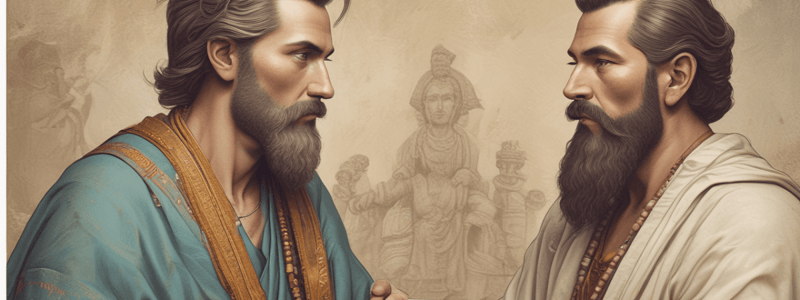Podcast
Questions and Answers
The word 'barber' is derived from the Latin word 'barba' meaning:
The word 'barber' is derived from the Latin word 'barba' meaning:
- to cut
- hairdresser
- shave
- beard (correct)
The first culture to cultivate beauty in an extravagant fashion was the:
The first culture to cultivate beauty in an extravagant fashion was the:
- Egyptians (correct)
- Greeks
- Africans
- Romans
In ancient Rome, a woman's rank was indicated by her hair's:
In ancient Rome, a woman's rank was indicated by her hair's:
- length
- ornaments (correct)
- texture
- color
Throughout history, hair and beard trends were set by:
Throughout history, hair and beard trends were set by:
In almost every early culture, people's hairstyles indicated their:
In almost every early culture, people's hairstyles indicated their:
The word 'barber' is derived from which Latin word?
The word 'barber' is derived from which Latin word?
Which culture first cultivated beauty in an extravagant fashion?
Which culture first cultivated beauty in an extravagant fashion?
In which location did barbering and hairstyling become highly developed arts?
In which location did barbering and hairstyling become highly developed arts?
In early times, what did the beard represent for almost all nations?
In early times, what did the beard represent for almost all nations?
What aspect of a woman's hair indicated her rank in ancient Rome?
What aspect of a woman's hair indicated her rank in ancient Rome?
Flashcards are hidden until you start studying
Study Notes
The Origin of Barbering
- The word "barber" originates from the Latin word "barba", meaning "beard".
- This Latin root is related to the concept of cutting or shaving.
Early Cultures and Beauty
- The Egyptians were the first culture to cultivate beauty in an extravagant fashion.
Barbering as an Art Form
- Barbering and hairstyling evolved into highly developed arts in ancient Egypt.
- In these ancient cultures, hairstyles and beards conveyed important information about individuals.
Hairstyles and Social Status
- In almost every early culture, hairstyles indicated a person's social status.
- In ancient Rome, a woman's rank was identified by the length of her hair.
Historical Influences on Hair Trends
- Throughout history, hair and beard trends were largely set by rulers and the wealthy.
- In early times, the beard was widely regarded as a symbol of wisdom.
- In ancient societies, warriors and rulers often influenced hair and beard styles.
The Origin of Barbering
- The word "barber" originates from the Latin word "barba", meaning "beard".
- This Latin root is related to the concept of cutting or shaving.
Early Cultures and Beauty
- The Egyptians were the first culture to cultivate beauty in an extravagant fashion.
Barbering as an Art Form
- Barbering and hairstyling evolved into highly developed arts in ancient Egypt.
- In these ancient cultures, hairstyles and beards conveyed important information about individuals.
Hairstyles and Social Status
- In almost every early culture, hairstyles indicated a person's social status.
- In ancient Rome, a woman's rank was identified by the length of her hair.
Historical Influences on Hair Trends
- Throughout history, hair and beard trends were largely set by rulers and the wealthy.
- In early times, the beard was widely regarded as a symbol of wisdom.
- In ancient societies, warriors and rulers often influenced hair and beard styles.
Studying That Suits You
Use AI to generate personalized quizzes and flashcards to suit your learning preferences.





